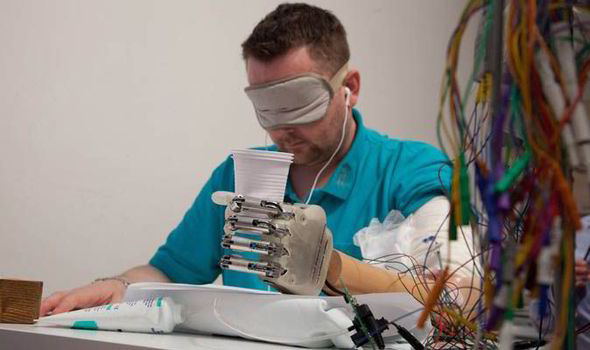New Prosthetic Hand Gives Sense Of Touch

Prosthetic hands, ones that really work, have long been the stuff of science fiction. In fact, so far-flung seemed the idea of an articulate robotic hand that you would see them featured mostly in sci-fi adventure stories like Star Wars, scarcely would they appear in “hard” science fiction and speculative fiction, with Neuromancer’s prosthetics being a notable exception.
In the last decade, however, we’ve seen robotic hands that respond to signals from the muscles in the arm well enough to gracefully pour a glass of beer without ruining the head. We’re still a little ways off from a robotic hand that feels and behaves just like the ones we’re born with, but researchers have just made a tremendous step in that direction with a prosthetic hand that can feel, and send sensations to the brain.
A team of developers at Scuola Superiore Sant’Anna in Italy and the Ecole Polytechnique Federale de Lausanne in Switzerland have created a robotic hand for Dennis Aabo Sørensen that senses friction and then sends it through a computer and into an electrode that signals Sørensen’s nervous system so that he can actually feel what his hand is doing. This allows for more articulate, delicate movement since he has instant feedback, he doesn’t have to look at his hand to know what it’s up to.
A number of possibilities going even beyond prosthetics are opened up by the notion of articulate, sensory-feedback robotics. To name just a few:
You want to visit China but you don’t have the time? Imagine plugging in to an android surrogate stationed in Hong Kong. You taste what they eat, feel what they feel, and you see, smell and hear what surrounds them. If we’re ever going to see full-body robotic surrogates, it’s probably going to be decades from now, but imagine the benefits not just for low-cost travel, but for those with physical disabilities beyond simply needing new limbs, who would otherwise never know what it was like to enjoy a pleasure as simple as running on the beach, feeling the sand between their toes.
Maybe the idea of feeling virtual bullets ripping through your imaginary flak jacket doesn’t sound like a lot of fun, but feeling the water splash around you when Mario jumps into the lake and feeling the gold coins jingling in your pocket as you run could be the next big thing in virtual reality gaming. If a bionic hand can send real physical sensations to your brain, why can’t your Xbox send virtual physical sensations?
The reason that we haven’t sent a human being to Mars yet, the reason that Antarctica is unpopulated, the reason we’ve only sent divers so deep: because it’s dangerous. Space bound sensory bionic surrogates could serve to help earthbound astronauts remotely perform tasks too delicate for Mars Rovers and other robots.
“It’s easier than ever to look at the rapidly-evolving world of modern technology and to want to become a Luddite, but it’s more important than ever that we take advantage of this tremendous opportunity to use that tech to change the world for the better,” said expert Jason Hope, “Prosthetics is one area where a few inspired minds can do a lot of good.”
A number of challenges still stand in the way of these possibilities. Primarily, Dennis Aabo Sørensen actually did lose his hand in a fireworks accident, which made it possible for the folks at Scuola Superiore Sant’Anna in Italy and the Ecole Polytechnique Federale de Lausanne in Switzerland to implant electrodes to receive signals for his nervous system.
It’s hard to imagine the average gamer wanting to undergo surgery in order to reconfigure their entire nervous system just to play on a video game console that’s going to be outdated within a couple of years.
All the same, the mind boggles at the possibilities. Neuroscience, prosthetics, and computing technology have been inching ever closer to the future hinted at in Neuromancer, an age where the line between what’s real and what’s simulated is not only very blurry, but not all that important.
License: Image author owned
About Author: Amy Taylor is a technology and business writer. Amy began her career as a small business owner in Phoenix, Arizona. She has taken that knowledge and experience and brought that to her unique writing capabilities. She really enjoys new business related issues that are tied directly to technology.
